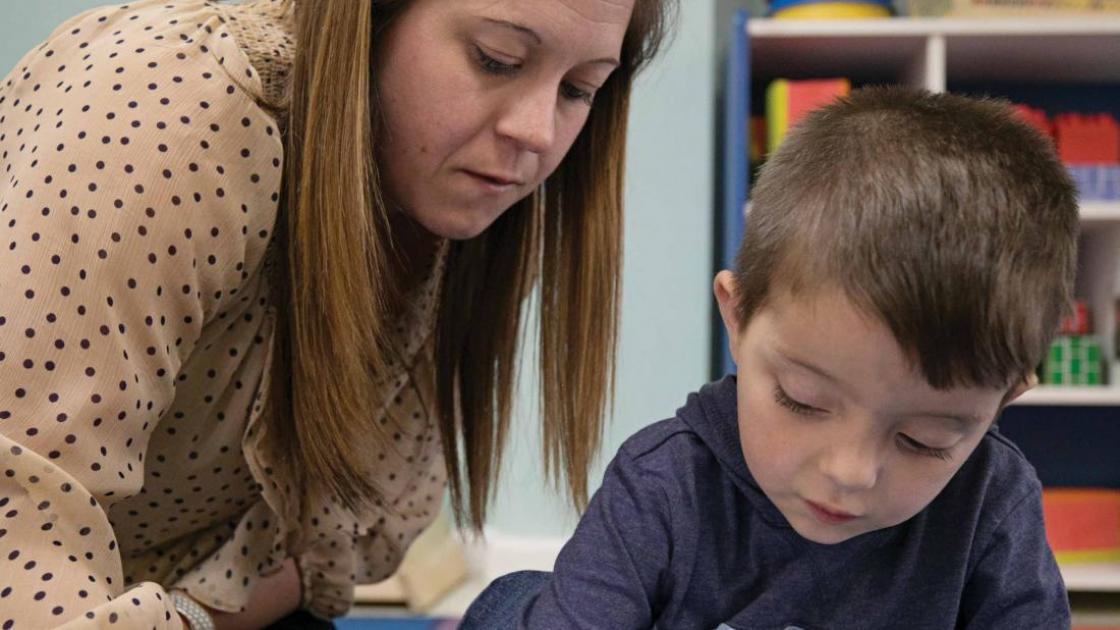
From Clinic to Community: Population Health Focus Strengthens
Written by Karen Carlson
Photographed by Jason Johnson
Published in Aspects Magazine, Winter 2018 (41-1)
Between birth and age 3, a child’s brain undergoes an impressive amount of change. The brain doubles in size in its first year, and by age three, it reaches 80 percent of its adult volume. This period of a child’s life is the most important for brain development—and it has inspired a new project from SIU Medicine’s Office of Population Science and Policy.
Called “Little Leaps,” the program, under way at Hillsboro Area Hospital, strives to increase parent engagement. One part of the program provides parents with bags filled with toys, games and activities. “At home, we do this instead of turning on the TV. You can learn and play with your kids,” said parent Meghan Maretti, who has two children in the program.
“I love how Little Leaps is educating not only the community, but the parents too, to give us the information and education we need to reassure us. It reiterates what I’m doing at home,” said Brooke Lang, another parent of two. “It gives me confidence that I’m doing the right thing and headed in the right path. The security of knowing my daughter is getting it here, and at home, gives me confidence that she is one step ahead of the other kids.”
Little Leaps is just one effort of the growing Office of Population Science and Policy (OPSP), led by Sameer Vohra, MD, JD, ’11. OPSP celebrated its one year anniversary last fall.
SIU Medicine joins a select number of US medical schools that have formal offices aimed to provide solutions to population health challenges. The creation of OPSP is the latest indicator of the strengthening direction of the “service” mission of SIU School of Medicine.
The medical school was founded to address the health care needs of a specific population – a unique mission among medical schools. “Our historic identity is the 66-county population of central and southern Illinois,” notes Jerry Kruse, MD, MSPH, dean and provost. “In the past few years, we have brought that into even clearer focus by designing programs aimed to improve the health of populations, not just the people who ask for care, but finding the people who need care.”
“We used to treat people who came to see us in the clinics,” adds Janet Albers, MD, professor and chair of the Department of Family Medicine. “But now, we are actively working with whole communities to improve their health.” The need is critical. According to the 2016 County Health Rankings, 22 of the 25 counties with the worst health outcomes in Illinois are in SIU SOM’s service region.
Long-established offices such as the Office of Regional Programs (ORP) and Family and Community Medicine, along with newer offices such as Population Science and Policy, topped with a plethora of new and innovative programs, are bringing SIU SOM’s population-focused mission to the forefront.
These efforts address the social determinants of health – the factors of life that contribute to disease that include education, socioeconomic status, health behaviors and home and community environments. According to the Robert Wood Johnson Foundation and the CDC, these conditions make up around 80 percent of health outcomes. “Our goal in medicine is to make our patients as healthy as possible,” Dr. Vohra says. “As we continue to learn more about the defining role social determinants play in an individual’s health, it our responsibility as a profession to better understand, discover, and devise strategies to address them.”
HELPING THE NEXT GENERATION
Little Leaps is one example of the focus OPSP is bringing to improve quality of life and health for children.
The Little Leaps program provides training in parent engagement. It also provides interventional resources if a developmental delay is discovered in the children from ages birth to 51/2. The program will track the same group of 75 children at Hillsboro Area Hospital’s day care over the next two to three years. “We can learn more about how to help them with early success and figure out what more interactive and play-based activities families need,” says Jeanne Koehler, PhD, OPSP’s social innovation director and assistant professor of medical education. “We can get in there and give them more activities and more things to learn that strengthen those areas. We try to capitalize on that fast-growing brain so it can have a lasting impact.”
Sheri Reynolds, the day care coordinator, says Little Leaps is bringing a lot to the program and has potential beyond the day care. “Once the research is in, we will be able to share it with others in the community.”
Rex Brown, president of Hillsboro Area Hospital, says the partnership with the medical school, along with support from the Hillsboro Hospital’s Foundation, is making a difference for his community. “Youth programs like ‘Little Leaps’ help us partner with others and connect with families.”
The baby-brain development effort is in partnership with Office of Regional Programs, which has additional outreach offices in Canton, Mattoon and Carbondale.
The Center for Rural Health and Social Services Development also has numerous projects underway, serving children and the elderly in southern Illinois, advocating for physical health and assisting in transportation to medical services. One new program is the community paramedicine program, aiming to lower readmissions and improve chronically ill patient care.
HELPING THE UNDERSERVED
As a Federally Qualified Health Center, the Department of Family Medicine in Springfield has taken the lead on integrating population health with existing services to address the social determinants of health with the underserved population. “For so long, I felt helpless that all I could do was treat them in the office,” Dr. Albers says. “Now we have so many wrap-around services available to help patients in family medicine and in other SIU departments.”
One of those programs is the Medical-Legal Partnership, launched with $215,000 in federal grant funds in 2015. SIU partners with The Land of Lincoln Legal Assistance Foundation attorney Rachel Miller, who works on-site at FCM to meet with patients twice a week. Miller has already helped patients in more than 300 cases.
The clients are grateful for free assistance with personal issues that can affect their health. This includes divorce, housing, or applying for food stamps or disability insurance. Some get help finding mental health counseling and even find volunteer opportunities. Family medicine instructor Meghan Golden, LCSW, notes that Miller has helped domestic violence victims maintain housing, clients obtain social security payments and others understand the process and the paperwork of the complex medical and legal systems.
A national movement, nearly 300 Medical-Legal Partnerships are at work in 41 states. “SIU was selected as one of the original six FQHCs that Health Resources and Services Administration (HRSA) funded to use Medical-Legal Partnerships as an enabling service,” notes Carolyn Pointer, JD, OPSP policy director and assistant professor of medical humanities. “One thing that is different about our program is that we teach second-year medical students to screen patients in the hospital for legal issues affecting health needs. Other programs use residents, not students.” SIU is evaluating this problem-based approach to teaching students about the social determinants of health and providing a valuable service to our patients.
This work, Pointer notes, addresses the “upstream” issues that affect patients’ health, such as mold remediation in apartments. Pointer and Dr. Vohra are working on policy issues related to poor housing conditions, domestic violence or access to food in the Springfield area in conjunction with the Community Roundtable, a collection of community leaders.
The Nurse-Family Partnership (NFP) brings another national movement to the SIU School of Medicine community. As an evidence-based program, nurses visit the homes of first-time pregnant women and mothers to offer advice, support and resources through their child’s second birthday. More than 42 states have a nurse-family partnership program.
Since launching last August, the SIU program has enrolled 18 clients among three nursing staff. Two babies have been delivered. The moms’ average age is 22, and two-thirds are African-American. “New moms are getting the resources and support they need to give their child a healthy start in life,” says Hope Cherry, program administrator.
One young mom says the visits from her nurse helped her overcome her anxiety. “The nurse let me know that everything would be fine and that everything I do now is for my son. Once I heard those words, everything changed. She helped push me past my comfort zone, and that’s what I needed. I’m thankful for this program because it’s showed me I can do anything I set my mind to. I schedule appointments now, and I want to get my nursing degree. I want to make more of myself and be the best mom I can.”
PATIENT-CENTERED
These complex and collaborative efforts into population health activities are “keeping SIU Medicine in step with the changing landscape of health care, which is moving toward a value proposition-model,” notes SIU Medicine Chief Medical Officer Harald Lausen, DO. He says that SIU Medicine has been working for years to address population health with SIU patients through safety, quality measures, costs and improvements in clinical care activities. Examples include an event reporting system, community electronic health record, standardized documentation, and partnerships with clinical integration networks.
“This results in a downstream impact for the patients and the region we serve,” he says. “Focusing on efforts to improve patient care, quality, and access improves the health status of the patient and addresses the value proposition. The more engaged our patients are, the more preventive screenings they receive, the better control of chronic disease management — the less they become ill and the less they will need the emergency department or hospital. That results in cost savings.”
Valuing patients’ health can result in increased reimbursements from insurance providers, such as Medicare, which has transitioned to the Quality Payment Program. “The better we do as a whole health-care community, the more we will all benefit,” Dr. Lausen says.
From patient care to partnerships from research to relationships, SIU is strengthening its foothold in the 66 counties of central and southern Illinois.



